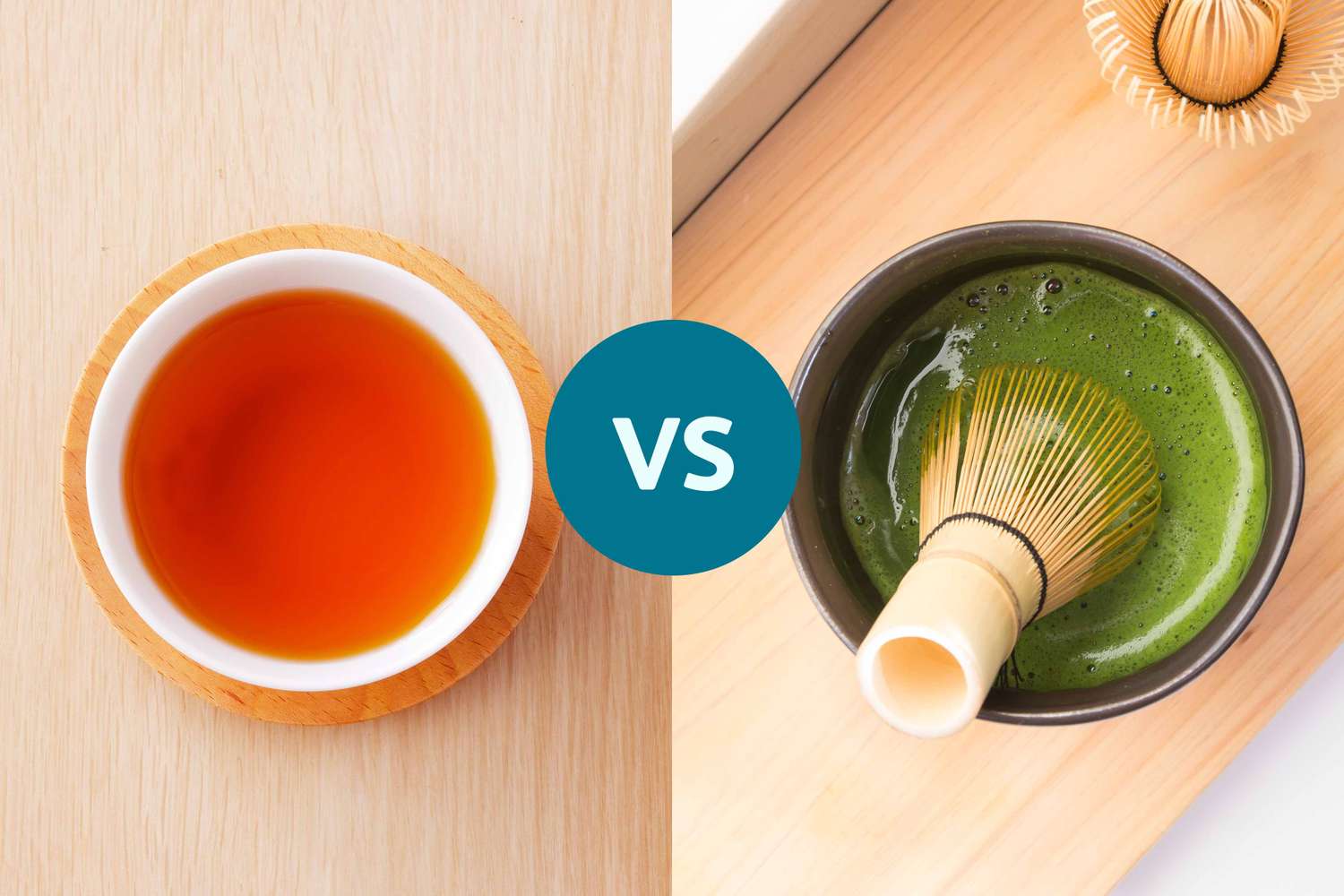Matcha is a finely ground powder of green tea leaves with a high caffeine content, while hojicha is a roasted green tea with less caffeine. While both offer health benefits, matcha may contain more energy-boosting compounds and antioxidants.
Which One Has More Caffeine?
Hojicha leaves are roasted at a high temperature, greatly reducing their caffeine content.
Matcha has much more caffeine and therefore offers a greater boost of energy, said Lauri Wright, PhD, RDN, the director of nutrition programs and an associate professor at USF College of Public Health.
Caffeine content:
– Hojicha: 8 mg of caffeine per 12-oz cup
– Matcha: 38 to 178 mg of caffeine per 12-oz cup
“Matcha contains caffeine along with L‑theanine—a combination known to promote alert, focused energy with less jitteriness,” Wright said.
L-theanine is an amino acid that has been shown to reduce stress and anxiety, helping to minimize the jittery effects that are often associated with caffeine.
While hojicha doesn’t provide the same energizing effects as matcha, some research suggests that it may offer anti-fatigue properties.
“Hojicha is a good option for those sensitive to caffeine,” said Manoj Sharma, PhD, a professor of public health at the University of Nevada, Las Vegas.
Which Has More Antioxidants And Heart Health Benefits?
Some studies suggest that matcha may benefit heart health by lowering LDL (bad cholesterol), reducing atherosclerosis (plaque formation), and reducing high blood pressure. This is partially due to its high antioxidant content.
One meta-analysis found that antioxidants called catechins, which are found in green tea, help lower blood pressure and LDL cholesterol levels.
Matcha is also rich in rutin, another antioxidant that may benefit heart health.
While both teas contain antioxidants, the roasting process reduces the content of these compounds in hojicha.
Sharma said both beverages may also offer anti-cancer, anti-inflammatory, weight management, and cognitive benefits. However, matcha is believed to be more beneficial in these areas. More research is also needed to explore these potential benefits further.
Which Is Right For You?
Which Japanese green tea is right for you depends on your caffeine tolerance, preference, and the time of day.
If you’re looking for an energy boost paired with maximum health benefits, matcha is a good choice. But if it’s later in the day and you’re looking to relax or if you’re sensitive to caffeine, hojicha may be the better choice.
Or you could drink both to maximize the benefits.
“Enjoy matcha early in the day for its energy and antioxidant protection,” Wright said, “then switch to hojicha in the evening for its calm and relaxing effect.”
What This Means For You
Matcha offers more caffeine and antioxidants than hojicha, making it a more energizing option and potentially more beneficial tea. Hojicha is better for those who are sensitive to caffeine and are looking for a more calming, soothing beverage.
Verywell Health uses only high-quality sources, including peer-reviewed studies, to support the facts within our articles. Read our editorial process to learn more about how we fact-check and keep our content accurate, reliable, and trustworthy.
Dashwood R, Visioli F. L-theanine: from tea leaf to trending supplement – does the science match the hype for brain health and relaxation? Nutrition Research. 2025;134:39-48.doi:10.1016/j.nutres.2024.12.008
Kurosaka C, Tagata C, Nakagawa S, Kobayashi M, Miyake S. Effects of green tea and roasted green tea on human responses. Sci Rep. 2024;14(1):8588.doi:10.1038/s41598-024-59383-y
Sokary S, Al-Asmakh M, Zakaria Z, Bawadi H. The therapeutic potential of matcha tea: A critical review on human and animal studies. Current Research in Food Science. 2022;6:100396.doi:10.1016/j.crfs.2022.11.015
Khalesi S, Sun J, Buys N, Jamshidi A, Nikbakht-Nasrabadi E, Khosravi-Boroujeni H. Green tea catechins and blood pressure: a systematic review and meta-analysis of randomised controlled trials. Eur J Nutr. 2014;53(6):1299-1311.doi:10.1007/s00394-014-0720-1
Siti HN, Jalil J, Asmadi AY, Kamisah Y. Roles of rutin in cardiac remodeling. Journal of Functional Foods. 2020;64:103606.doi:10.1016/j.jff.2019.103606

Thanks for your feedback!
What is your feedback?
Helpful
Report an Error
Other

